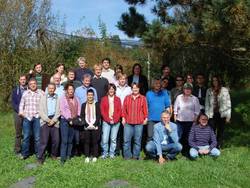OrganicDataNetwork presents achievements at project meeting
Twenty-eight participants attended the second meeting of the OrganicDataNetwork project on October 4 and 5, 2012 at the Research Institute of Organic Agriculture in Frick (near Basle, Switzerland).
At the meeting, progress in the work packages and the necessary measures, methods and timelines were discussed.
"Data on areas, livestock numbers and operators are usually published in all countries, but there are not so many market data", says Susanne Padel from the Organic Research Center in the UK. An online survey on data availability in Europe, with around 100 organisations replying, has now been evaluated. "The most important players in this field have answered the questionnaire", adds Helga Willer (FiBL). "In major countries like Germany we had four or five responses, but in small countries like Slovenia we still lack information“, states the project coordinator of the Organic Data Network: Raffaele Zanoli, from the Polytechnic University of the Marche in Ancona, Italy. Ulrich Hamm from the University of Kassel adds: "Some sell the data, so it isn't available if you do not pay for it".
"Monthly or annual data are needed mostly by the stakeholders", says Robert Home of FiBL who designed and evaluated a second survey on data needs of end users, together with Michal Lostak of the University of Life Science in Prague. A lack of sufficient data is seen by many as putting them at a competitive disadvantage. From 816 downloaded questionnaires, 256 people (31 percent) completed the questionnaire. The report on this survey will be finalised by end of this year. "To create a network is behind everything we are working for", said Zanoli and this is the credo of the whole group supporting the project of the Organic Data Network.
In the group discussion, problems in the collection and harmonisation of data were identified. Raffaele Zanoli presented the concept for a first workshop in 2013 for collectors of organic market data. "The first workshop is about identifying the problems, the second is about elaborating solutions“, he stated. Matthias Stolze of FiBL explained: "At the workshop we want to bring the people in contact with each other and - this is our main aim - to bring forward a long lasting network between the stakeholders".
"Data are not yet harmonised ", Corinna Feldmann of Kassel University, Germany, said in her presentation,„and the insufficient data which exist are not easily available“. Her suggestion was to find a reference country with a good system that can be used as a benchmark for others. Other related projects should also be looked at to achieve an optimisation of the methodologies. Or turning the question around: how valid are analyses made from an incomplete data set?
Camille Moreau from Agence Bio in Paris reported that the French had now finalized their data collection for 2011. „Agence Bio just released the market data at a domestic level for each category of products in a 260 page report. The French market is estimated to be worth 3.755 billion euros. Of this, fruits and vegetables represent 16 percent and the wine sector almost 10 percent. The public catering sector is worth 158 million euros. By end of this year, a market value of almost 4 billion euros is expected.
Joan Picazos from the company Biocop, a small and medium enterprise (SME) in Barcelona, said: "In Spain, we sometimes have the data on areas and livestock from the ministry as early as in February, but this year they only came in September. A detailed market data analysis was carried out only once so far. In Portugal only the data from 2010 are available at this stage." The situation is also difficult in some of the Central and Eastern European countries.
In the framework of the project, the currently available market data about domestic organic sales, import and export figures and also figures about the consumption in canteens and catering will be compiled. Price data will not be collected, but if they are available, there will be a link to the source.
Helga Willer of FiBL presented the progress achieved in work package 4 – data collection - and explained how the data received by the local partners will be compiled.
Representing the General Directorate Agriculture and Rural Development of the European Commission (DG Agri), Luis Martin Plaza took part in the meeting in Frick. The next project meeting – which will be the third - will take place in Newbury, UK, on 14 and 15 March 2013. The workshop for stakeholders will take place prior to this meeting on March 13.
Author: Kai Kreuzer, Organic-Market.info, Germany
Further information
Contact
- Prof. Dr. Raffaele Zanoli, Project Coordinator, University of Ancona, Italy
- Kai Kreuzer, Organic-Market.info, Germany
Contact
Kai Kreuzer
Bio-Markt.Info
Waldstrasse 4
36341 Lauterbach
Germany
Tel. +49 6641 6443008
Fax +49 6641 6445189
kk(at)bio-markt.info
www.bio-markt.info
Contact
Prof. Dr. Raffaele Zanoli
Università Politecnica delle Marche
Via Brecce Bianche
60131 Ancona
Italy
Tel. +39 071 2204929
zanoli(at)agrecon.univpm.it
www.univpm.it
 This website was archived on January 11, 2020 and is no longer updated.
This website was archived on January 11, 2020 and is no longer updated.
